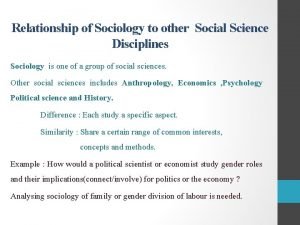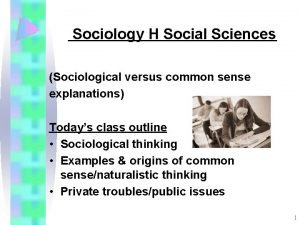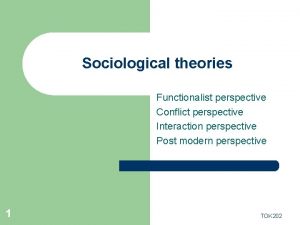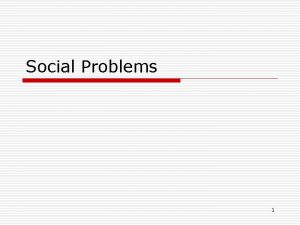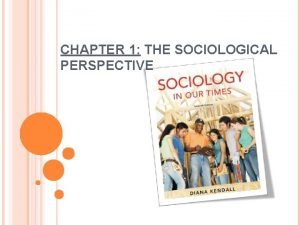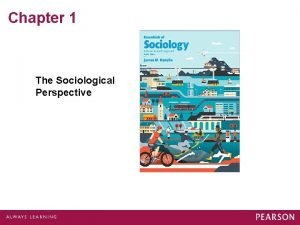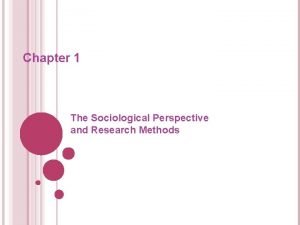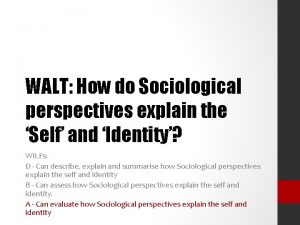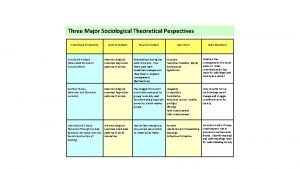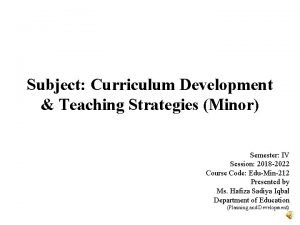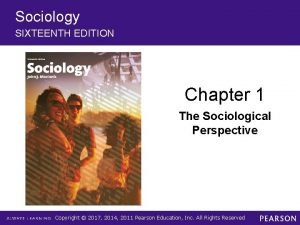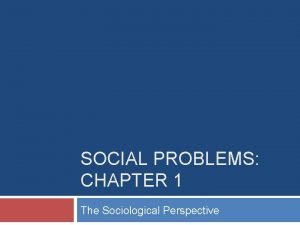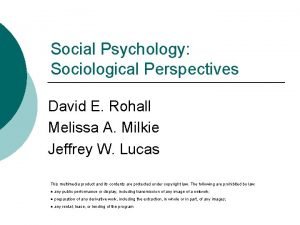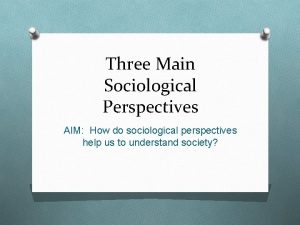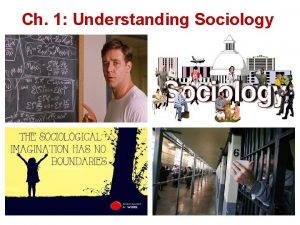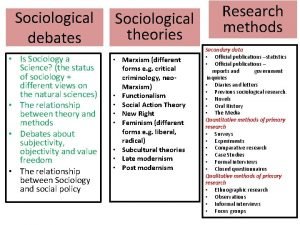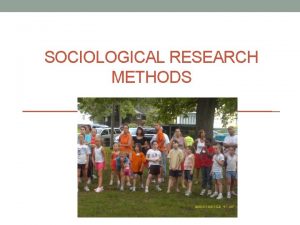Sociology as a Science The Aim of Sociological




















































- Slides: 52

Sociology as a Science

The Aim of Sociological Research To move from subjective to more objective knowledge of something: Subjective knowledge An individual’s everyday understanding that comes from their values, experiences and beliefs. Objective knowledge Knowledge that is independent of opinion, prejudice and bias. © onlineclassroom. tv 2007

Ways of collecting Data • Quantitative data – based on numbers and statistics – Objective and goes with Positivist • Qualitative data – based on rich descriptions of events – Subjective and goes with Interpretivist • Primary data – collected direct from participants by the researcher • Secondary Data – are data which already exist in form of statistics, diaries, personal documents etc. • Mixed Methods – mixing two or more methods

POSITIVISM Emile Durkheim claimed Sociology should be totally objective and value-free. Sociology should study observable stuff: social facts, that can be recorded as quantitative data so correlations can be identified between variables. Watch – don’t judge. Interpretivism Max Weber claimed Sociology cannot be value-free. Sociologists will use their subjective feelings to identify a research topic & the concepts they feel are relevant. Qualitative data such as feelings, motivations and experience are important to gain a true understanding

POSITIVISM – The Scientific approach uses comparative and experimental methods

1. Our knowledge about the social world starts with the collection of facts – For example, the crime rate, the divorce rate and the number of men that are victims of domestic violence.

2. We create a hypothesis (prediction) about what we observe so that we can study it. Eg. Children from low income households are more likely to become criminal.

3. We can look for (study) correlations – where two or more things happen at the same time between different social facts. For example, a correlation between women being in care and becoming deviant. To do this we will collect some data.

4. We will analyse our data and see if a positive correlation is found, for example, educational failure causes greater likelihood of criminality. We will use statistical analyses

5. We can develop theories that explain the relationship between different facts. Eg. Having insufficient integration into society explains why some commit suicide. Remember though that a correlation is not the same as causation !

6. Once we have a theory – test it further. If nothing happens to disprove theory, we have discovered a universal law of human behaviour.

7. Once a law is identified in human behaviour, we can incorporate it into social policy – we can organise people through laws & legislation that will engineer the best results for society.

Criticisms of Positivism • There is a problem with correlations and cause and effect. • Can we really study humans in the same way as natural phenomena like plants? • Can any scientists, especially sociologists really be objective and value-free? • Individual experience is part of what makes us human and should not be ignored.

Interpretivism – the not-so scientific approach

This is HOWARD BECKER. He says it’s impossible to study anything without using your personal and political beliefs to understand judge it.

Some Sociological theories are clearly allied to a particular political leaning. For instance, Marxism is a conflict theory which sees capitalism as problematic for human happiness and fairness. Marxism is therefore left wing. Feminism also, is a conflict theory which sees patriarchy as problematic for women’s happiness and fairness. Feminism also, is therefore left wing.

Different researchers interpret every scenario differently. What’s this fella doing here. Would you go on holiday with him?

Starter What method would Atticus Finch think is the best for researching society based on the below quote? • "You never really understand a person until you consider things from his point of view - until you climb into his skin and walk around in it. " spoken by Atticus Finch, To Kill a Mockingbird, by Harper Lee

Verstehen Weber’s term for studying human behaviour German word for “to understand”, “to grasp by insight” Best interpreter of human action is “someone who has been there” Someone who can understand the feelings and motivations of people they are studying- empathy

People like Weber say Sociology should study society from the perspective of other people to understand how and why things happen. Using Weber’s perspective of verstehen requires subjective understanding which draws on people’s opinions. Science is strongly objective and does not allow opinion to influence research. For this reason, Interpretivists argue Sociology cannot ever be a science.

Interpretivism and Symbolic Interactionism • Blumer (1969) argued sociologists need to immerse themselves in the lives of those they study. • It is necessary to understand the meanings created by individuals and groups. • An example is Paul Willis – Learning to Labour • See film.

Criticisms of Interpretivism • Research carried out on a micro scale is high in validity but low in representativeness and reliability therefore lacks scientific rigour • Is qualitative research on low numbers of participants meaningless? • Ignores the existence of social norms and a basic order of things and sometimes focuses too heavily on deviant groups.

Realist Methodology Realists are not committed to either quantitative or qualitative research. They argue it is best to choose methods which suit the particular area of study. They acknowledge that subjective experiences are important They distinguish between ‘open’ and ‘closed’ systems of causality. Natural sciences work within closed systems where predictions can be made and empirical data collected. They refer to society as an open system (This means being realistic and accepting that humans and society are complex and changeable and subject to countless influences.

Feminist Methodology • Reinhartz (1992) Women’s ways of knowing. • Grounded in Feminist Theory and moving away from Malestream research • Uses various methods • Aims to bring about social change • Researcher builds rapport with participant and is included as part of the research. • Reflexivity is important (researcher acknowledges their own influence on the research)

Criticique Critics say feminist research is not objective since it is grounded in feminist theory Feminists argue that reflexivity is a strength since it allows them to be open about their values from the start – therefore they do not falsely claim to be valuefree but state how their values have influenced their research. Some argue feminist research is no longer relevant in the 21 st Century. Realist approaches have been accused of sitting on the fence and refusing to commit to a scientific approach

Key concerns in research. When we evaluate how well a piece of research has been carried out we consider the following things. • • Generalisation Representativeness Objectivity/Operationalisation Validity Ethics Reliability GROVER

Generalisation • Can the results of the study be applied to wider society? • E. g if you studied knife crime in Torquay could you apply the findings to the whole of UK? • Likewise if you only studied use of kitchen knives as a weapon you could not gain generalisable results.

Representativeness • Does the sample of people you studied accurately represent the population. • E. g If you are studying anti-social behaviour of young people but only studied boys, your sample would not represent ‘young people’

Operationalisation • Has the study correctly defined what they are studying. • E. g If you wanted to study happiness but defined this as having Sky television it would not be a very accurate study!

Validity • This is related to the accuracy and truthfulness of your findings. • E. g If you went to lower school and asked everyone whether or not they smoked you would probably find that 100% said no! BUT…. .

Ethics • British Sociological Association have guidelines which must be followed. • Informed Consent • Privacy/confidentiality of participants • Protection from harm caused by potential deception, embarrassment etc • Right to withdraw from the study

You want to study children’s playground behaviour. • You get a video camera and film the children secretly from the branches of tree outside the playground. • You show the film to colleagues to analyse your results.

You want to find out attitudes towards underage drinking in your area • You ask some year 10 and 11 students to complete a questionnaire. You ask them for their names and addresses so that you can contact them again if there any problems with their responses.

You want to find out about empathy for snails • You get consent from a number of students to take part in a study about snails. • When they arrive you tell them that they have to step in a box of snails and crush them all so that you can monitor facial expressions. • When they are finished you say thank you and ask them to leave.

Reliability • This is about the way the data is collected. • If it is a consistent measure such as a questionnaire with yes/no answers then another sociologists could repeat the study and get similar results. • If is say an interview/conversation then another sociologists might get different results and the study might be unreliable.

Starter – identify whether these are criticisms of quantitative and qualitative data • Variables cannot always be isolated and cause and effect cannot be established • Lacks scientific rigour • Findings cannot be generalised so are of little use • Researchers can never be value-free or completely objective • Statistical analysis can lead to misinterpretation of the data • Open to subjective interpretations of researchers • Of little use to large-scale organisations like government. • Numbers cannot provide explanations

Quantitative methods include: • • • Social Surveys Questionnaires Structured Interviews Statistical data Content analysis Experiments

Qualitative Methods include: • • • Observation Ethnography Interviews Focus Groups Analysis of personal document Complete the ‘Evaluating research methods’ grid either from the blog or on paper

Experiments (rarely used in Sociology) • Laboratory experiments are conducted in a controlled environment where the relationship between two variables can be tested. E. g Bandura’s bobo doll experiment. • They are highly scientific and reliable but also very artificial so may lack validity • Field experiments are partly controlled but conducted in a natural setting e. g classroom, seeing if sitting at the back hinders learning.

Example of experiments • Rosenthal and Jacobsen Pygmalion in the classroom. • Jane Elliot brown eyes blue eyes. • Bandura bobo doll • Stanley Milgram – study on obedience • Zimbardo – Standford Prison study. • http: //www. youtube. com/watch? v=9 Qyqxk. M_Z 94 • http: //www. youtube. com/watch? v=K 7 Jne. NPZlt. U&feature=related • http: //www. youtube. com/watch? v=no 1 F-AMTn. Gg&feature=related

Complete ‘evaluating research methods’ grid, the Sampling methods sections – use AS textbook pages 78 -81 Sample: a segment of the target population being studied. Probability or Random Non-Probability or Non[reflects the population] random Ø Random [does not reflect the population] Ø Quota Ø Systematic Ø Snowball Ø Stratified Ø Purposive © onlineclassroom. tv 2007

Access • Access to participants is a big deal in sociological research. Sometimes it can be difficult. • Consider some of the difficulties you might find if you had to access these particpants • Children under 3, Young Offenders, Mentally ill. • Often there will be a person who will facilitate access, for example to school pupils, this person is referred to as a gatekeeper

Examples • Researchers want to study the experiences single mums living in inner city areas. They need 20 women to take part. • Researchers wish to study incidents of suicide amongst children under 16. They need 4 or 5 families to take part. • A university needs 5 Asian, 5 Black and 5 white people under 21 to take part in research.

Examples • 40, 000 homes in the UK are selected by a computer to take part in the British Crime Survey. • 15 boys and 15 girls are to be selected from 3 different 6 th form colleges. • Researchers receive an alphabetical list of all people with alzheimer’s in a hospital to take part in research they must select 20 participants with no computer

Quantitative Data Analysis • Quantitative data consists of numbers, so we look for patterns and trends indicated by statistics e. g percentages, averages etc. These data can be presented in various ways • Table form e. g like the sheet with the subject choices data from last year. • Graph form may include • Bar charts • Histogram • Scattergraph for correlations • These make the data easier to analyse for patterns.

Analysing Qualitative Data • Qualitative Data consists of rich data in the form of words i. e personal answers to open questions. • This requires a degree of interpretation of written text. • We need to look for emerging patterns or themes. The key themes are identified and then included in our analysis. The analysis will be descriptive as well. • Read the article on Asian Gangs by Claire Alexander and note the findings (they are not statistical !)

Starter • How would you go about researching the extent of poverty amongst children in UK society? • What problems would you have to overcome?

Research Design • Aim, a statement about what your overall aim is • Hyposthesis (If quantitative) a prediction about what you think will be found • Operationalisation (how are you measuring/defining the concept e. g class inequalities) • Sampling method (how will you get access to your participants and select them? ) • Method used (primary or secondary data collection and actual method) • Procedure used, how you would actually carry it out • Analysis of the data, how would you analyse it and what you might expect to find. • Evaluation. A couple of paragraphs at most explaining any problems you might anticipate with data collection e. g time, cost, access to sample, and problems with the design itself in terms of GROVER, see above. • A way to remember order of above list: - • A Hippy only smokes marijuana properly after eating. •

Operationalising concepts • How would you go about measuring the following concepts? • Family income • Sexual orientation • Ethnicity • Social class • Happiness Which concepts are objective and which are subjective?

Research Design • Refer to the example research design in your booklets and complete AIM, HYPOTHESIS and OPERATIONALISATION for this question. • As an A level Sociologist, you have been asked to research whether young single mothers become pregnant in order to avoid work and gain benefits. • Suggest a simple research design and justify your choices. Explain the difficulties that you might experience in carrying out your design and suggest how you would avoid them

Quantitative research design example questions • As an A level Sociologist, you have been asked to design a quantitative study into the impact of student loans on graduates in your area. Suggest a simple research design and justify your choices. Explain the difficulties that you might experience in carrying out your design and suggest how you would avoid them. • As an A level Sociologist, you have been asked to discover whethere is gender inequality in the behaviour and actions of the police in your area. Suggest a simple research design and justify your choices. Explain the difficulties that you might experience in carrying out your design and suggest how you would avoid them

Qualitative research design question • As an A level Sociologist, you have been asked to design a qualitative study into the impact of poverty on pensioners in your area. • Suggest a simple research design and justify your choices. Explain the difficulties that you might experience in carrying out your design and suggest how you would avoid them • As an A level Sociologist, you have been to discover qualitative differences between how working class and middle class students see their class position. • Suggest a simple research design and justify your choices. Explain the difficulties that you might experience in carrying out your design and suggest how you would avoid them
 Sociological imagination vs sociological perspective
Sociological imagination vs sociological perspective Favourite subject
Favourite subject Is sociology a science essay
Is sociology a science essay Social science meaning
Social science meaning Relationship of political science with economics
Relationship of political science with economics Sociology vs political science
Sociology vs political science Relation between political science and psychology
Relation between political science and psychology Is sociology a social science
Is sociology a social science Is sociology a science
Is sociology a science Sociological theories of crime
Sociological theories of crime Agency theory examples
Agency theory examples The sociological perspective stresses
The sociological perspective stresses Examples of common sense and sociological explanations
Examples of common sense and sociological explanations By adopting a sociological imagination
By adopting a sociological imagination Sociological theories
Sociological theories Conflict sociological perspective
Conflict sociological perspective Symbols in sociology
Symbols in sociology What are social problems
What are social problems Sociological criticism
Sociological criticism Sociological examples
Sociological examples Micro sociological perspective
Micro sociological perspective Chapter 1 the sociological perspective
Chapter 1 the sociological perspective Peter berger seeing the general in the particular
Peter berger seeing the general in the particular Chapter 1 the sociological point of view answer key
Chapter 1 the sociological point of view answer key The looking-glass self
The looking-glass self Three major sociological perspectives
Three major sociological perspectives Pragmatism and curriculum
Pragmatism and curriculum Sociological perspective on race in philippines
Sociological perspective on race in philippines The sociological perspective is a point of view that
The sociological perspective is a point of view that Sociological bases of curriculum
Sociological bases of curriculum Jural postulates of roscoe pound
Jural postulates of roscoe pound New historicism literary theory
New historicism literary theory Sociological perspective
Sociological perspective What are the 3 foundations of curriculum?
What are the 3 foundations of curriculum? Unit 10 sociological perspectives health and social care
Unit 10 sociological perspectives health and social care The sociological imagination chapter 1 summary
The sociological imagination chapter 1 summary How sociologists view social problems: the abortion dilemma
How sociologists view social problems: the abortion dilemma Technique in writing sociological
Technique in writing sociological Sociological imagination examples race
Sociological imagination examples race Sociological interview
Sociological interview Youtube sociological imagination
Youtube sociological imagination Sociological factors that affect voting behavior
Sociological factors that affect voting behavior What is sociological criticism
What is sociological criticism Translates
Translates Sociological perspective on mental health
Sociological perspective on mental health Sociology, 16th edition
Sociology, 16th edition Help
Help Conflict theory
Conflict theory Social issue examples
Social issue examples Sociological theory
Sociological theory Social logical imagination
Social logical imagination Aliran pragmatic legal realism
Aliran pragmatic legal realism Social psychology sociological perspectives
Social psychology sociological perspectives



